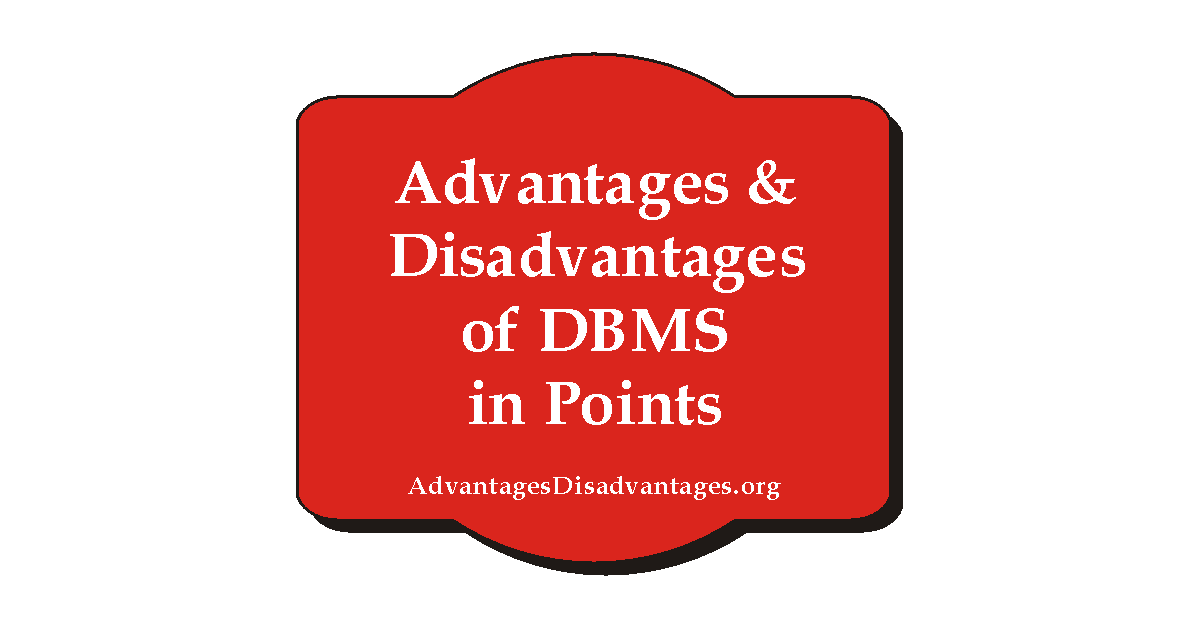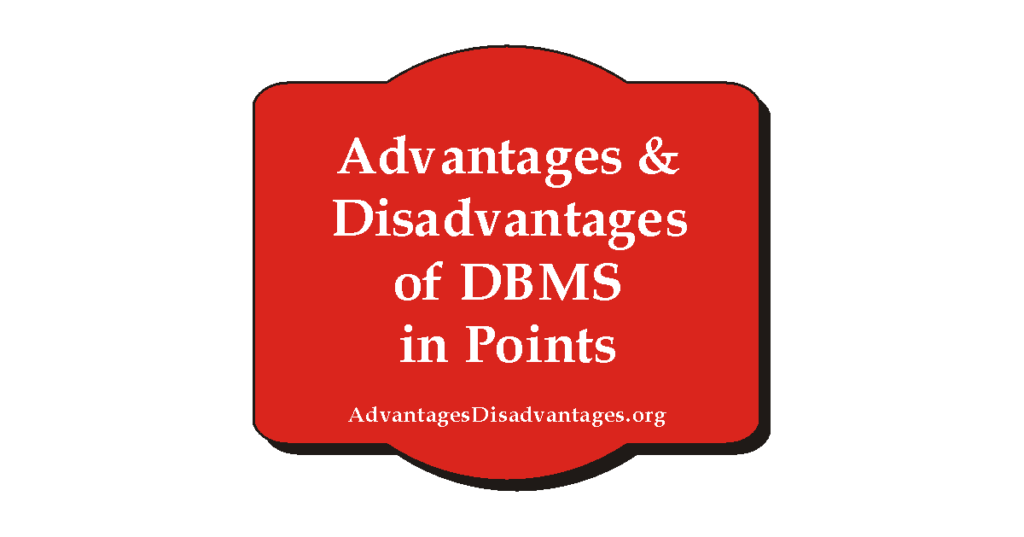Tech
Advantages and Disadvantages of DBMS in Points

In the article, you will get to know the Advantages and Disadvantages of DBMS. DBMS is also known as Data Base Management System. However, for those people who still don’t know what DBMS is? So we are here for the short and perfect answer. A DBMS is a kind of system which helps people to solve problems with such a traditional system of File Processing. Although, to overcome such deep problems and tough issues, the Database Management System was actually Introduced. Furthermore, the Merits of DBMS is here with the main purpose of manages the structure of a database and further handles access to the data which has been stored in the database. The DBMS works as a type of an agent between the database and the user. Therefore, the structure of a database itself is actually stored as a files collection, so, people can finally access the data in such files via the Data Base Management System. However, the DBMS accepts all type of application requests and further get access to translate them within the complicated operations expected to meet those requests. Hence, the DBMS stores enough of that database’s inner difficulty from the application programs and as well as users.

Table of Contents
Why Is Data Base Management System Important?
A database management system or DBMS is actually a very important purpose for people because it has the ability to efficiently manage data and also allows users to get easily perform multiple tasks at the time. Although, a database management system organizes, stores, and as well as manages a generous amount of information just in a single form of a software application. Also, the use of this DBMS system improves the performance of business operations and also decreases overall costs.
Database management systems are also important to organizations and businesses because the system provides an extremely effective method for managing various types of data. However, the data which can be easily managed with this type DBMS system included:
- The overall records of employees,
- An information about student,
- Payroll,
- Project management,
- Accounting,
- Inventory and library books.
Though, these systems are developed to be greatly versatile. Also, without a database management system, tasks and other necessary operations have to be done by manually, which takes much time. So, that’s why having a database management system is very important, especially nowadays. Let’s read the “advantages and disadvantages of DBMS”.
What Are the Main Advantages and Disadvantages of DBMS or Data Base Management System
Advantages of DBMS
- Data Sharing Can Be Improve
The basic advantages of the DBMS are that it further helps to develop a genuine environment in which end users can get better access to manage better data easily. Certain access executes it possible for those end users to react in a quick manner to further make adjustments in their environment.
- Helps To Secure Data Accurately
When users access more data, it will simply enhance the chances of security get improved and getting a risk of data violation can also be reduced. However, corporations spend significant amounts of effort, money, and as well as time to further assure that corporate data are going to be used properly. Also, a DBMS gives a kind of framework for genuine enforcement of the privacy of data and as well as security policies.
- Improve Data Integration
Full access to further well-managed data supports an integrated way of the businesses’ operations and an open transparent view of the huge picture. However, it even becomes much easier to notice how progress in one segment of the business hit other segments though.
- Developed More Data Access
The DBMS performs in a way to get the things possible to basically produce quick answers to those ad-hoc queries. Although, from a perspective of a database, a query is actually a kind of specific request assigned to the DBMS for more data manipulation.
- Improve End-User Productivity
The last advantages of DBMS is the access of data, connected with the agents that further transform data into valuable information, enables end users to easily make active, informed choices that can cause the distinction between failure and success in the overall global economy. That were some Advantage of DBMS now let’s read some Disadvantages of DBMD
Disadvantages of DBMS
- Cost increment
This is one of the basic disadvantages of DBMS that it actually demands a sophisticated software and hardware and as well as highly skilled personnel. Somehow, the cost of the hardware maintaining, software, and personnel maintaining actually required to manage and operate a database system, can be actually substantial.
However, training, regulation, and licensing agreement costs are usually overlooked just when the systems of a database are implemented.
- Complexity of Management
Database systems can be easily interfaced with various different technologies and also usually have an important impact on an organization’s culture and resources. Though, just with the fact that database systems contain critical company data that are also easily get obtained from various sources, issues of a security must be imposed constantly.
- Maintaining the Currency
To even maximize the performance of the system of a database, people must have to keep their system current. Therefore, people must have to perform usual updates and further apply the advanced patches and as well as security rules to all other components.
What Are The Types Of Database Management System?
As we all know that a database is a basic collection of information and records. However, database management systems are created as the purpose of managing those necessary records. Database Management is a fast and secure software system that further uses a conventional method and managing queries with any of them meant for the error and as well as full-on control of databases.
Although, there are four basic structure types of DBMS which are given below:
- Hierarchical Databases
In the Hierarchical Database type, people should have to discover the points about the databases. It is also a very fast and as well as a simple method. However, in a hierarchical database record, which simply contains a bunch of information about the parent/child group of relationship, same like a tree structure.
- Network Databases
Network databases are largely managed on an extended digital computer. It furthermore connections can easily be made within various types of data. However, network databases hold limitations must be viewed when people have to do work with this kind of database. Although, network database resembles more like a cobweb or even as an interconnected network of basic old records.
- Relational Databases
A relational database, the connection which you have seen between data files is called as “relational”. Hierarchical and network databases need the user to further pass a hierarchy in a manner to obtain needed data.
These databases have a link and get connected to the data in various files by utilizing common data figures or as well as a key field. However, a data in relational databases is collected in various access control tables, also, each one holding a key field that actually largely identifies each row.
- Object-Oriented Databases
The object-oriented database source is the honor of object-oriented programming systems of language and compatible systems. The control of the object-oriented databases appears from the treatment of cyclical of both constant data, as observed in databases, and temporary data, as found in performing programs.
Final Words
So, yes database management system is important and necessary in many related factors, but also, it can provide other side-effects as well. However, we have to maintain and resolve the privacy issues of such collective information so that we can save our system for further damages and violations. And don’t forget to rate our article about Advantages and Disadvantages of DBMS in below comment box.

-

 Health5 years ago
Health5 years agoAdvantages and Disadvantages of Milk
-

 Tech4 years ago
Tech4 years ago6 Tips to Improving E-Commerce Websites
-

 Home5 years ago
Home5 years agoAdvantages and Disadvantages of Village Life in Points
-

 Travel5 years ago
Travel5 years agoAdvantages and Disadvantage of Travelling
-

 Sports3 years ago
Sports3 years agoThe benefits of playing an online live casino
-

 Tech5 years ago
Tech5 years ago10+ Advantages and Disadvantages of Mobile Phones in Points
-

 Tech5 years ago
Tech5 years agoEssay on Advantages and Disadvantages of Offline Shopping
-

 Tech5 years ago
Tech5 years ago8+ Advantages and Disadvantages of Motorcycle |Having Bike